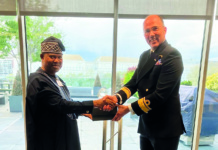Black, African and Caribbean people make up just 0.6% of active blood donors despite representing 4.4% of England’s population, according to the latest figures released by NHS Blood and Transplant. The figures have been released by NHS Blood and Transplant to coincide with the start of National Blood Week (9-15 June) to encourage more people from Black, African and Caribbean communities to donate blood and save lives.
NHS Blood and Transplant needs donors from all communities and ethnic backgrounds to donate so it can continue to meet the needs of all patients in England and North Wales now and in the years to come. Donations are vital to ensuring patients always get the treatment they need and some blood groups such as O Rh positive and B Rh positive are more prevalent among black donors.
Jon Latham, Assistant Director of Donor Services and Marketing at NHS Blood and Transplant said: “Blood donors are amazing, every time they give up some of their free time and donate, they save lives. We believe they belong to the Greatest Team in the World! While people from all communities and backgrounds do give blood, only 4% of our blood donors who have donated blood in the last two years are from Black, Asian or Minority Ethnic communities. This is compared to Black, Asian or Minority Ethnic communities representing around 14% of the population. We want to try and readdress this balance.
“This National Blood Week we’re encouraging people from all communities who haven’t donated before to join our team. Each year we need around 200,000 new donors to replace those who can no longer donate because of ill health, foreign travel, pregnancy or other reasons. If you’ve not donated before, why don’t you come and join us?”
Balbinder Kaur, who suffers from Thalassaemia, knows exactly how important blood donors are and is supporting the Greatest Team in the World campaign. She needs blood transfusions once every four weeks to keep her alive. Balbinder said:
“People like me need blood to live. It feels like receiving a gold medal. I have more energy, I feel better, it gives me haemoglobin and it keeps me alive. I appreciate everyone who donates blood to save my life.”
NHS Blood and Transplant’s call for people to get off the bench and become a blood donor comes at an important time. Stocks usually fall at this time of year, and it’s particularly important that O Rh Negative and B Rh Negative blood donors and platelet donors continue donating.
Jon Latham continued: “We plan our blood donation sessions so we collect the right amount of blood at the right time to meet the needs of patients and we keep a very close eye on our blood stocks. The number of people donating blood often falls during the summer and this year’s Football World Cup may cause even more of a distraction. So we’re reminding donors who have an appointment during June and July to keep it and encouraging those who haven’t donated before to register, find a local session, book an appointment and start saving lives.”
In general, as long as you are fit and healthy, weigh over 7 stone 12 lbs (50kg) and are aged between 17 and 66 (up to 70 if you have given blood before) you should be able to give blood. If you are over 70, you need to have given blood in the last two years to continue donating.
For more information or to book an appointment visit www.blood.co.uk or call 0300 123 23 23.










